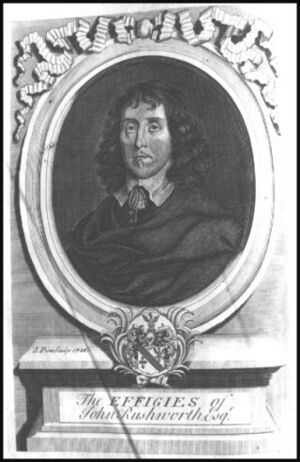John Rushworth facts for kids
John Rushworth (born around 1612, died 1690) was an important English lawyer, historian, and politician. He was a member of the English Parliament at different times between 1657 and 1685. He is best known for his detailed writings about the English Civil Wars, which happened in the 1600s. These writings are called Historical Collections or the Rushworth Papers. They are a valuable record of that time.
Contents
Early Life and Education
John Rushworth was born at Acklington Park in Warkworth, Northumberland, England. His father, Lawrence Rushworth, was a wealthy landowner. John became a solicitor, which is a type of lawyer, in Berwick on Tweed in 1638. In 1640, he joined Lincoln's Inn, a famous place in London where lawyers are trained.
Also in 1640, Rushworth started working for the House of Commons, which is part of the English Parliament. He was the first person to hold the job of assistant clerk, helping the main clerk, Henry Elsynge. This role allowed him to be present for many important events.
Reporting on the Civil Wars
The 1640s were a time of great conflict in England, known as the English Civil Wars. John Rushworth became like an "embedded journalist" of his time. He followed the armies and reported on major battles. He was present at:
- The Battle of Edge Hill in 1642
- The Battles of Newbury in 1643 and 1644
- The Battle of Marston Moor in 1644
- The Battle of Naseby in 1645
In 1645, he became the secretary to Thomas Fairfax. Fairfax was the commander of the New Model Army, which was the main army fighting for Parliament. Rushworth carefully recorded details of events leading up to, during, and after the trial and execution of King Charles I. He also reported on the Battle of Preston (1648) and the Battle of Worcester in 1651.
Working with Oliver Cromwell
After King Charles I was executed in 1649, England became a republic, meaning it was ruled without a king. John Rushworth became the personal secretary to Oliver Cromwell. Cromwell was a powerful military and political leader. Rushworth helped to plan for a new English Republic, without a king or the House of Lords, which was the upper house of Parliament.
When Oliver Cromwell became Lord Protector in 1653, Rushworth was promoted. He became the Registrar of the Court of Admiralty, which handled legal cases related to the sea. In 1657, he was elected as a Member of Parliament for Berwick. As part of Cromwell's government, Rushworth became friends with many famous people, including the writer John Milton and the preacher John Bunyan.
After Cromwell's Death
Oliver Cromwell died in 1658, and his son Richard Cromwell took over as Lord Protector. Rushworth was re-elected as MP for Berwick. He finished his historical writings from this period and dedicated them to Richard Cromwell. However, Richard Cromwell was not as strong a leader as his father.
By 1660, the government was changing again. Rushworth became Secretary of the Council of State, a powerful group that ran the country. He was re-elected as MP for Berwick in the Convention Parliament. This Parliament worked to bring back the monarchy. They invited King Charles I's son, Charles II, to return to England and become king, but with Parliament having more power.
When Charles II became king and the monarchy was restored, Rushworth was given a new job as a lawyer for the Treasury. He even returned some important government records that he had saved during the Civil War.
Later Years and Legacy
John Rushworth continued to work in public service. In 1667, he became secretary to Sir Orlando Bridgeman, a very important judge. He also worked for the American colony of Massachusetts, helping them with their affairs in England.
Rushworth was elected as a Member of Parliament for Berwick again in 1679 and 1681. He supported the Whigs, a political group that believed Parliament should have more power than the king.
Despite holding important jobs, Rushworth faced financial difficulties later in life. He spent his final years in a prison for people who owed money, called the King's Bench Prison. He passed away on May 12, 1690, and was buried in St. George's Church, Southwark.
Rushworth's detailed historical writings, the Historical Collections, became very important. In America, Thomas Jefferson, one of the founding fathers of the United States, owned a copy and often quoted from it. Rushworth's views on King Charles I, who he believed had declared war on his own people, influenced later thinkers like Jefferson.
In 1890, the area where Rushworth spent his last years was redeveloped. A school named Rushworth School was built on the site, and a nearby street was renamed Rushworth Street in his honor.
Family Life
John Rushworth married Hannah Widdrington. Her brother, Sir Thomas Widdrington, later became the Speaker of the House of Commons. John and Hannah had four daughters:
- Hannah, who married Sir Francis Fane in 1664.
- Rebecca, who married Robert Blaney in 1667.
- Margaret.
- Katherine, whose letter about her father's death is a historical record.
 | Toni Morrison |
 | Barack Obama |
 | Martin Luther King Jr. |
 | Ralph Bunche |


